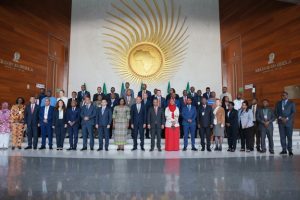
The world we live in is rapidly changing to the worst due to the ever-increasing carbon emissions. Understanding the adverse effect of climate change, many countries have been conducting scientific researches and coming up with pertinent findings or solutions.
Apart from conducting researches, scientists are now coming up with new innovations that have significant value for the reduction of carbon footprint. The technologies or innovations can transform developing nations’ economic and technological landscape. With advancements in artificial intelligence, the internet of things, and electric vehicles, these nations have a burgeoning potential to leapfrog traditional developmental stages.
The third world countries, which are highly exposed to climate change related impacts, do not have the capacity to get the green technologies which have great significance in terms of minimizing carbon emission.

Yong Jun Baek (Dr), is a researcher in Energy and Environment Policy. He told The Ethiopian Herald that international cooperation is highly needed to transfer tangible and intangible climate technologies to third world countries. However, transferring tangible climate technology alone is not helpful to these countries to resist climate crisis, building their soft power is also equally imperative.
The Korean Institute of Green Technology in which he is currently working is performing various tasks on transferring green technology. The institute is also making them with funding. The institute is focusing on policy, matchmaking those technologies that are developed in Korea and trying to transfer them to the developing countries through international cooperation.
“Institute like us supporting the developing countries under the UNFCC. We have the CTCN which provides technical assistance to the developing countries. It is a need-based one. If a given country requests a climate technology, we try to fine-tune them with various kinds of technologies.”
“At the end, what we need to achieve is to create a climate technology market. In this regard, I personally think ODA – a government aid designed to promote the economic development and welfare of developing countries, is very important.”
Funding the Small and Micro Enterprises to innovate appropriate technologies that fit the need of the recipient countries and arranging short and long term capacity building trainings are the missions given to the Institute, he said.
All the developed countries have done Research and Development on ways of transferring the advanced technologies to the recipient countries. With these climate technologies, they are not only helping improve climate resilience but also assisting the development their economies.
Pointing that it is hard for the developed countries to support businesses abroad, his country for instance, support SMEs to invest in the business of the African countries. The climate technologies can be transferred to the African countries through following as a win-win approach. “That is why I am focusing and emphasizing on the importance of international cooperation and technological transfer.”
When countries are developing, they rely heavily on development projects which contribute to the severe damage of the environment. They do not have given enough space for the environment protection or preservation. After they reached to the turning point, the countries are urbanized enough devoid of focusing on the environment.
As the country develops, the environment pollution level will come down. That is a traditional path way which the African countries should not expect to pursue. These countries still use coal or more fossil fuel instead of turn much quicker from the customary way to applying climate technologies.
Ensuring sustainable development and climate change are the two important things that the Africa countries need to overcome. At this juncture, the third world countries need to have access to the state of the art technologies and disseminate knowledge across their respective countries. When we think of transferring technologies to the developing countries, the important thing that comes to our mind is the Official Development Assistance (ODA).
Even though the government funding is important, there is a limit to how much a government can do. Government runs with taxes as the assistance coming from the pocket of its people. So, there is always a limit on how much it can fund.
What I think ODA can do is start things off or kicks start. This in itself is not an end or goal. Eventually, developed countries need to create a climate technology market. So, ODA is a system that developed countries are helping the third world countries and ODC is a committee that processes the ODA. Business should be able to be a part of that ecosystem for them to come in.
So, we start off with public sector financing and eventually move towards private sector which is really difficult for them to as they are established to make profit. However, climate technology is not the business area where investors preferred to engage in as it is not make them profitable. It is important to combat climate change as the world reached to a record high level of carbon emissions and the situation is getting worse and worse.
However, it is not the role of private business to handle social issues such as climate change. Even though the money is there, the private sector does not have a reason to jump into it. The government has to do it because it is one of its roles. As it is a global issue, countries in the world get together and work to redress the climate change impacts.
In order for attract the private sector to green technology; companies need to get some kind of incentive. That is where the ODA try to pull them in. Large companies have enough resource and manpower to involve in the sector interested in. However, small and medium enterprises have the technology or innovation but they have not have the resources. So, we help them through various funding and help transfer technology to different countries.
In our green earth program, our institute tries to help all small companies that have the climate technology but do not have the funding or resources or network to create business out of it. We are helping them find networking or areas their technologies make use. So concerning them we are match making with the developing countries that requires to have these technologies.
BY GIRMACHEW GASHAW
THE ETHIOPIAN HERALD FRIDAY 2 FEBRUARY 2024





